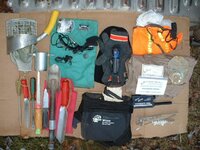rayray3
Jr. Member
Greetings,
I have a Ex2 coming this week and ive never detected before so i dont have any equipment for it. Im thinking I should get a few items.
1. Kneepads
2. Dectector cover
3. Digging knife
4. That predator shovel thing
5. The swingy thingy/bungy cord
6. Gloves
7. Apron or trashbag
What items are a "must have" for just starting out.
Thanks,
Rayray
I have a Ex2 coming this week and ive never detected before so i dont have any equipment for it. Im thinking I should get a few items.
1. Kneepads
2. Dectector cover
3. Digging knife
4. That predator shovel thing
5. The swingy thingy/bungy cord
6. Gloves
7. Apron or trashbag
What items are a "must have" for just starting out.
Thanks,
Rayray
Amazon Forum Fav 👍
Upvote
0


 .
.






